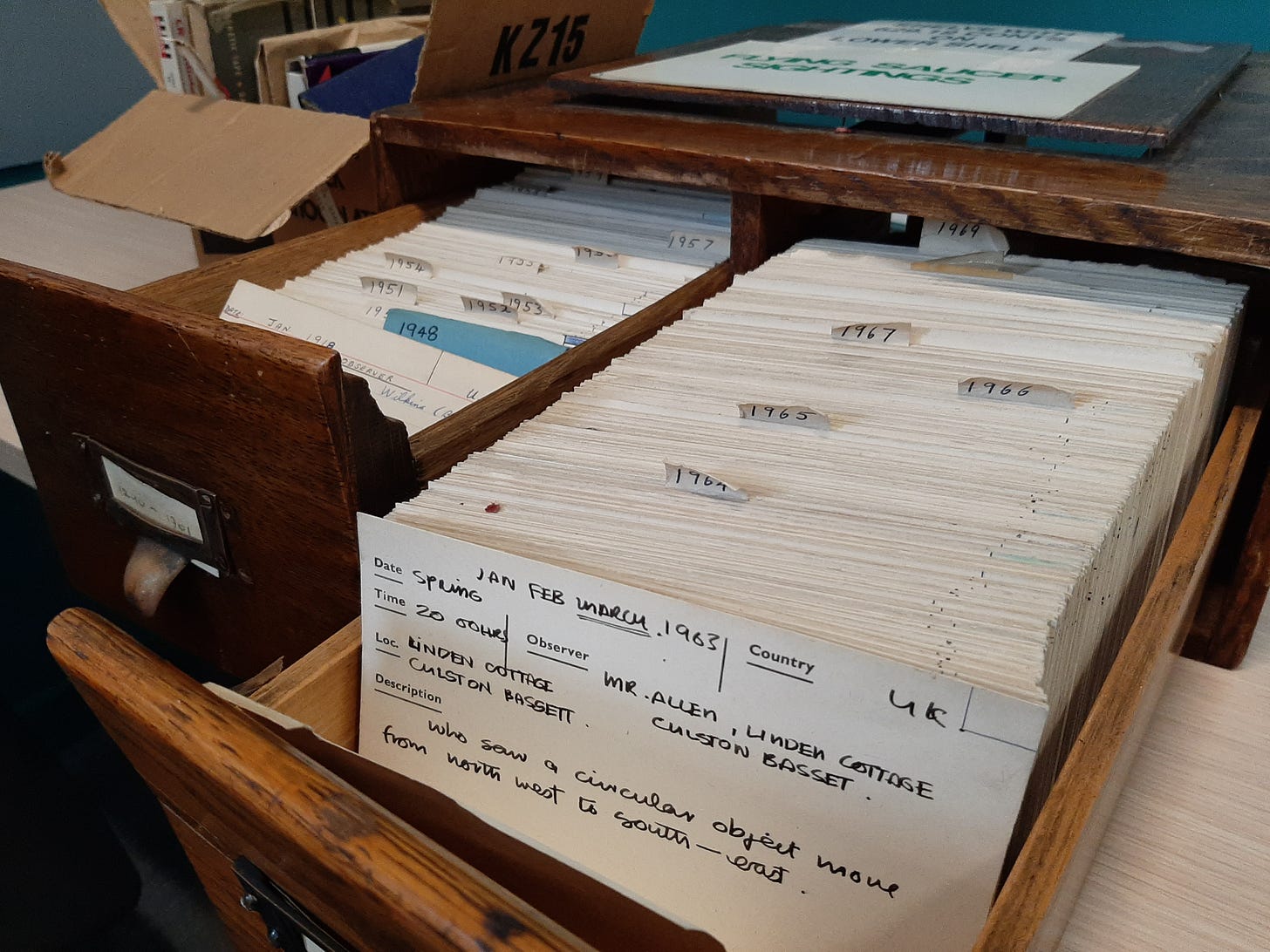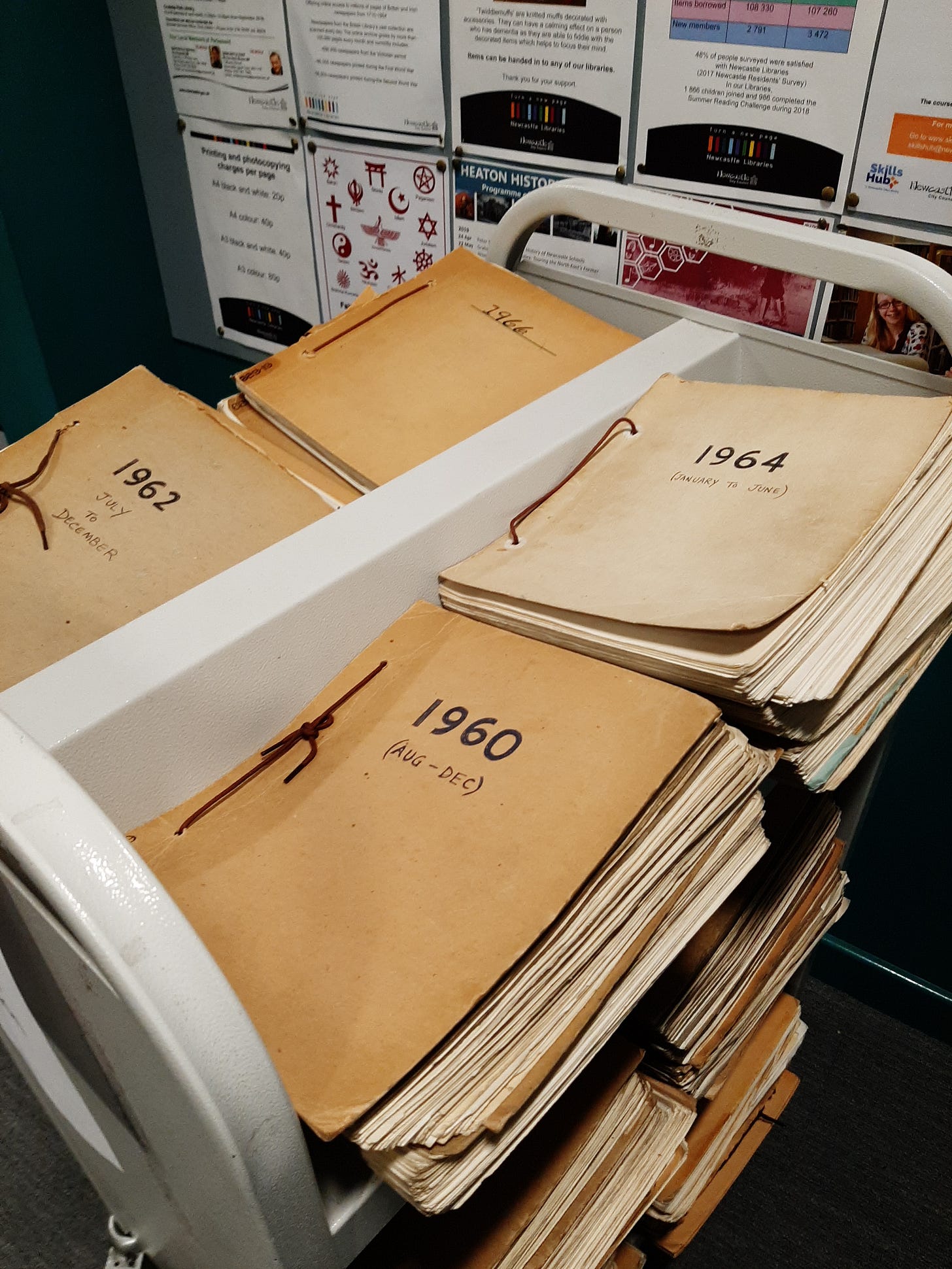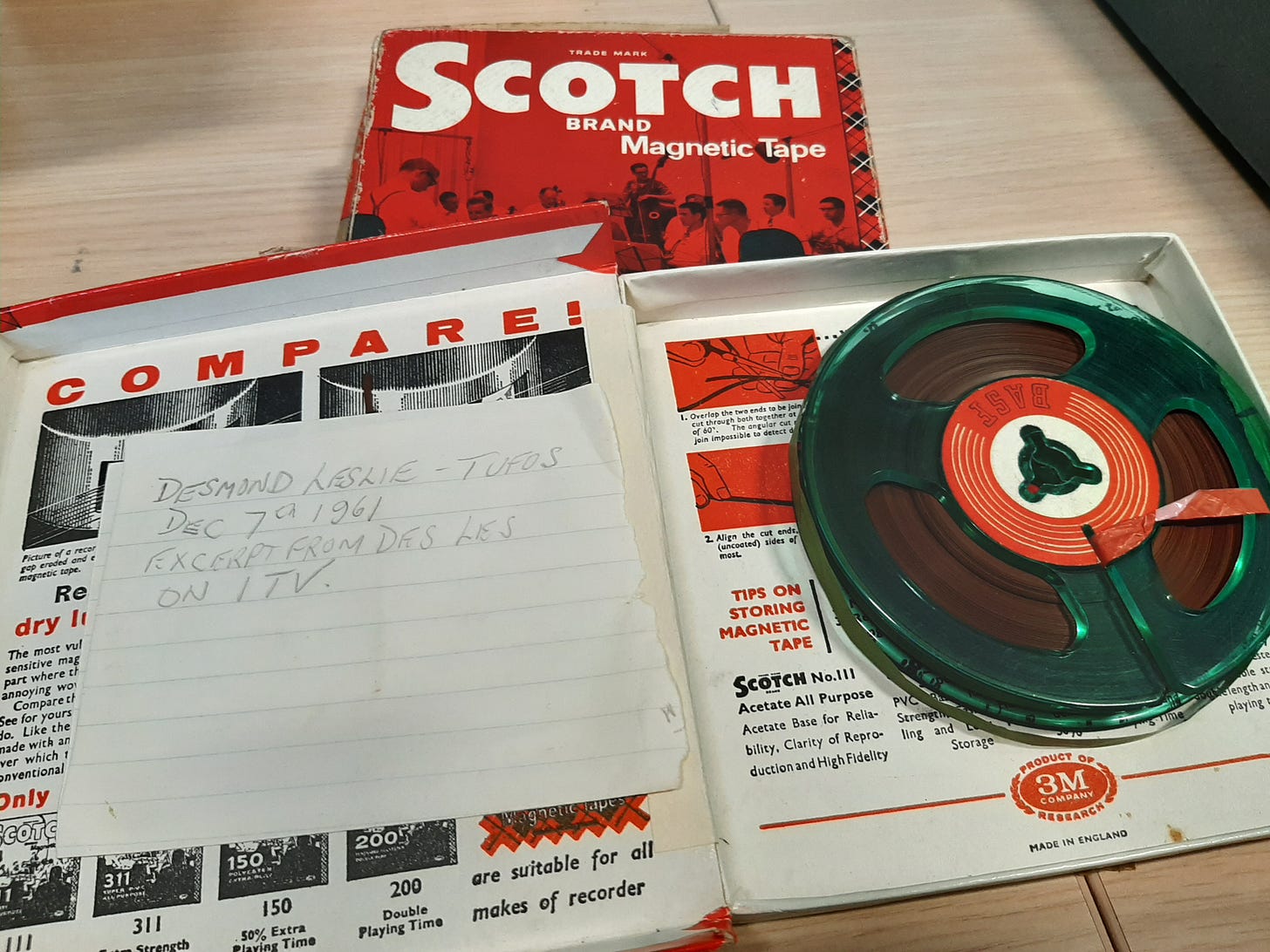‘This is a valuable record of occurrences connected with visits to this planet by unknown entities in flying saucers and other unidentified flying objects. It must not be destroyed or taken apart…it is hoped that in the event of some major catastrophe, this record and others like it will help to prevent the truth of these visits from becoming legends or myths to future survivors’

.These prescient words were typewritten by Henry Bennett Lord in July 1960 when members of the Tyneside UFO Society (TUFOS) donated their precious materials to the people of Newcastle-upon-Tyne, via the city’s Central Library.
The TUFOS archive includes audio tapes, scrapbooks, glass lecture slides, a card index of sightings covering 1947-69, files covering investigations and copies of the society’s bi-monthly magazine Orbit.
TUFOS began in 1959 following a visit to the city by the famous UFO contactee George Adamski. The Polish-American émigré made headlines in 1953 when his book Flying Saucers have Landed, co-authored with Irish writer Desmond Leslie, rode a worldwide wave of interest in UFOs (or what we now call UAPs).
Adamski was one of the first ‘contactees’ who claimed to have met angelic aliens from Venus and Mars and to have travelled in their craft to planets within our solar system. These stories are deeply unfashionable today. But in the 1950s they made an enduring impression upon the individuals who had become drawn into the growing mystery - leading them to create clubs, societies and organisations such as TUFOS.

A tape recording of Adamski’s sell-out public lecture at the Curragh Hall in Newcastle on 5 May, 1959, transcribed in hand-writing by TUFOS chair J. Leslie Otley, forms the centrepiece of the collection.
But there are many other treasures, including hand-painted glass lecture slides depicting ‘classic’ UFO encounters and records of the group’s investigation of a wave of mysterious ‘craters’ that appeared across the English countryside in 1963-64 pre-dating interest in crop circles by two decades.
For the past half century since the society disbanded its fascinating archive has been kept safe in the library’s strongroom. The scrapbooks and paper files alone fill one large metal trolley but there is currently no access to the fragile 8-track and long-play reel-to-reel audio tapes.
But with minimal public awareness of its existence and no prospect of funding to digitise the contents, the scrapbooks and magnetic tapes have slowly deteriorated. These issues were obvious when I visited Newcastle Library to examine the collection in the mid-1990s.
On my last visit in 2019, shortly before the Covid lockdown, it was obvious that urgent action was needed to save the most vulnerable pieces of the archive.
Step forward Clas Svahn and the Archives for the Unexplained who intervened to help save this unique piece of British UFO history.
Thanks to an ongoing collaboration between AFU, Newcastle Central Library and the Centre for Contemporary Legend at Sheffield Hallam University the TUFOS archive is currently en route to Norrkoping in Sweden.
On arrival it will be catalogued and digitised after which the originals will be returned to Newcastle. The partners wish to eventually make the contents of the archive available to library users and the wider public via a digital platform (watch this space for updates)
.The TUFOS archive story highlights an ongoing dilemma facing those with an interest in the curation of heritage materials that fall outside subject areas deemed as worthy of preservation for future generations. This raises an important question:
What happens to UFO-related materials when their owners die or groups and societies that collected data disband?
The answer is that many unique private collections have been lost or ended up in refuge tips after their owner’s deaths. Others, like Philip Mantle, have decided to pre-empt the inevitable and donate their existing collections to interested archives outside the UK.
It is a fact that in the UK UFO and other fringe archive collections (e.g. those relating to supernatural and/or paranormal and crypto-zoology) are still regarded with suspicion by publicly-funded organisations that would normally take an interest in all manifestations of popular culture.
For example, The National Archives have a statutory duty to identify and preserve collections of historical importance. But even the records of British Government investigations have received scant interest from such bodies. Until relatively recently, as their own recently-released records reveal, TNA reviewers regarded UFO papers as ‘trivia’ and of ‘no administrative or historical value’ (DEFE 24/3122/1). In 1986 one MoD records officer opined that ‘I personally doubt MoD would lose much if we filed UFO reports in the waste paper bin’…and that is precisely where many of them ended up.
Destruction of records continued until 2005 when, much to the chagrin of the MoD, the arrival of the Freedom of Information Act (FOIA) saw UFOs become one of the top three most popular subjects for FOI access requests from the public.
Three years later I acted as curator for the open government project that saw the transfer of the surviving files from MoD to The National Archives. During this exercise, that ran from 2008 to 2013, there were 4.7 million page views and 3.9million downloads of the ten tranches of UFO file releases. As a direct result of the resultant public and media interest in their content, in 2011 UFOs were added to their list of MoD records selected for permanent preservation.
Despite the success of The National Archives UFO project the immediate problem facing private UFO archives remains acute in the UK. There is still currently no public or privately funded archive with a declared interest in the preservation of ‘intangible cultural heritage’.
Since 2015 London-based blogger Isaac Koi has made a valiant attempt to use new technology to make available online thousands of defunct UFO and related magazines, newsletters and documents. His laudable aim is, by doing so, it will be easier to scrutinise and analyse some of the claims that have been made in the past. But for records to be digitised, the originals have to exist and access arrangements are subject to copyright permission being granted.
Outside the UK, Professor Jeffrey Kripal’s Archives of the Impossible acts as both repository and research hub for North American materials. In Europe Sweden’s Archives for The Unexplained (formerly Archives for UFO Research) continue to rescue numerous private collections, both from the UK and further afield, that remain at risk.
My own small contribution was the creation of a UFO legend archive at Sheffield Hallam University in 2022. This currently sits alongside the Professor John Widdowson Folklore Collection that was acquired by the library for use by students and staff in the Centre for Contemporary Legend research group.
The UFO legend collection currently holds photographic materials (including the famous Calvine photograph) and files created by the UFO Investigators Network (UFOIN) during the 1970s and 1980s. Eventually it will include parts of my own personal archive of UFO related materials. This includes case files, interview transcripts and several hundred box-files of unique primary research materials.
My own experiences working to save what some had described as ‘the archives of the damned’ has been an eye-opener. What I have learned is that some of the more vulnerable private collections require international collaboration to rescue and, crucially, make available to a wider public and those who wish to use them for research.
As Henry Bennett Lord said in his donation document addressed to Newcastle Library in 1970: ‘it is up to whoever acquires these records to value them and understand their full meaning’.



Hi David,
I applaud your efforts to create a UFO legend archive at Sheffield University. I’m sure you are aware that there is a wealth of UFO related material on archive.org.
Cheers,
Jim V.
Is there any update on the digitising project? TUFOS and Orbit were run by my grandfather so I’d love to read more of the publications, I only have a couple of issues of Orbit myself.